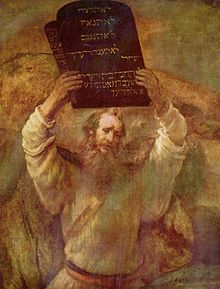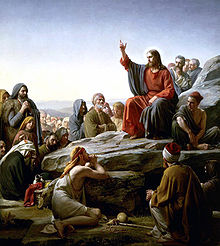- Mosaic covenant
-
The Mosaic Covenant (Law of Moses) or Sinaitic Covenant (Covenant of Mt. Sinai) are terms used for the biblical covenant between God and the Israelites. The establishment and stipulations of the Mosaic Covenant are recorded in the first five books of the Hebrew Bible, which are collectively called the Torah or Pentateuch.
Contents
Judaism
In the Jewish and Christian Bible God establishes the Mosaic Covenant with the Israelites after he has saved them from slavery in Egypt in the events of The Exodus. It is legally linked with the 613 commandments. Because Judaism views the Mosaic covenant as applying only to Jews, it advocates the much easier to observe pre-Mosaic Seven Laws of Noah for non-Jews. "Unlike Christianity, Judaism does not deny salvation to those outside of its fold, for, according to Jewish law, all non-Jews who observe the Noahide laws will participate in salvation and in the rewards of the world to come".[1]
The Mosaic Covenant played a role in defining: the Israelite kingdom c.1220-c.930 BCE; subsequently the southern Kingdom of Judah c.930-c.587 BCE and northern Kingdom of Israel c.930-c.720 BCE; the Hasmonean Kingdom 140-37 BCE; the Bar Kokhba revolt 132-136 CE; and Rabbinic Judaism c.2nd century to the present.
Christianity
The Mosaic Covenant, which Christians generally call the "Old Covenant" in contrast to the New Covenant, has played an important role in the shaping of Christianity and been the source of serious dispute and controversy since its inception, see for example the Expounding of the Law and List of events in early Christianity. After the resurrection of Christ, and the establishment of the church, the first Christian martyr recorded in the book of Acts (Stephen) is killed because of a controversy over the Mosaic Law and the Temple (6:13). Later, in Acts 15, the Council of Jerusalem addressed the Circumcision controversy in early Christianity. The Pauline epistles include passages that are seen as against the law and for the law, thus the relationship of Paul of Tarsus and Judaism is still disputed.
See also
- Biblical law in Christianity
- Biblical Mount Sinai
- Christianity and Judaism
- Covenant (biblical)
- Covenant theology
- Covenantal nomism
- Ten Commandments
References
- ^ H. Revel, Universal Jewish Encyclopedia; Universal Jewish Encyclopedia Inc., New York, 1939-1943, pp. 227-228.
External links

This Christian theology article is a stub. You can help Wikipedia by expanding it.


